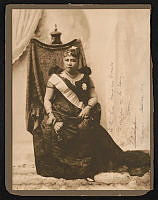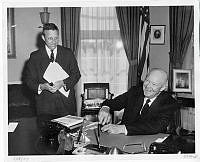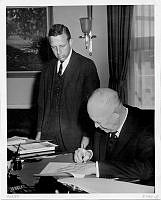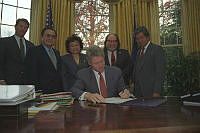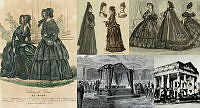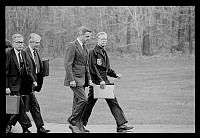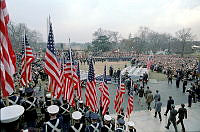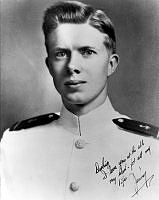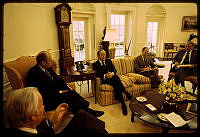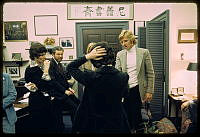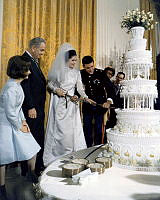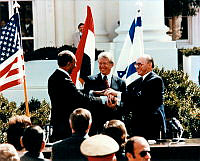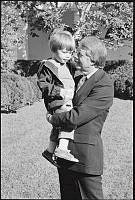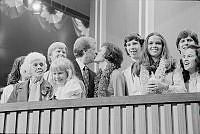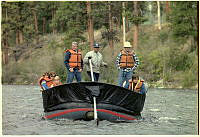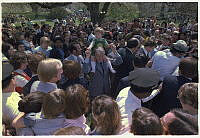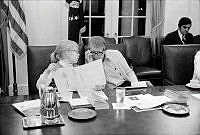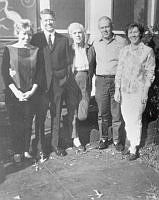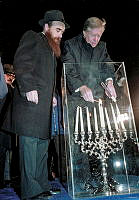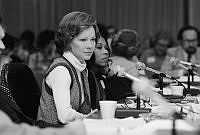Andrew Jackson

Andrew Jackson was born on March 15, 1767 near Lancaster, South Carolina, to a family of Scotch-Irish immigrants. His father, Andrew, passed away just a few weeks before his son's birth. All three Jackson boys—Hugh, Robert, and Andrew—were raised by their mother Elizabeth. The family settled in the Waxhaws near the North and South Carolina border, where they joined a large community of Scots-Irish farmers. At age thirteen, Andrew joined his older brothers in the fight against the British as the Revolutionary War raged in the Carolinas. Both Hugh and Robert died as a result of the conflict, and Andrew was left with a scar on his head from a British officer’s sword and a deep hatred for Redcoats.
After the war, Jackson moved to North Carolina where he studied law with several prominent lawyers. As white settlers pushed westward, new territories and opportunities emerged for Jackson. He served as a district attorney and later practiced law throughout Tennessee before settling in Nashville. In 1802, he was elected General of the Tennessee Militia, serving in different theaters as needed. In 1812, President James Madison commissioned him Major General of U.S. Volunteers and he led military campaigns against the Creek Nation. With their defeat, Jackson imposed treaties on the Creeks, Choctaws, Chickasaws, and Cherokees, securing millions of acres of land for white settlers. He was later called upon to wage war against the Seminoles. Jackson’s interpretation of his orders resulted in an invasion of Spanish Florida, and in 1819 Spain ceded the territory to the United States.
Despite winning the popular vote in 1824, Jackson lost the election in the House of Representatives as supporters of Henry Clay voted for John Quincy Adams. Jackson, who advocated for the common man and denounced corruption in government, ran again in 1828. The campaign was particularly ugly, as Adams’ supporters accused Jackson of executing troops unlawfully, illegally invading Florida, and engaging in innumerable brawls and duels. They also dragged Jackson’s wife, Rachel, into the fray, labeling her a bigamist. Despite these attacks, Jackson defeated Adams—but Rachel died at The Hermitage before he left for Washington. Jackson believed the campaign contributed to her death and he never forgave his political enemies. Although they never had children, they treated Rachel’s nephews, Andrew Jackson Jr. and Andrew Jackson Donelson, like sons. Their daughters-in-law, Sarah Yorke Jackson and Emily Donelson, also served as White House hostesses during Jackson’s presidency.
While Jackson was not very vocal about slavery, he was a prominent slave owner for most of his life. He brought enslaved people from The Hermitage to work at the White House, and he continued to purchase enslaved people while he was President of the United States. Jackson respected the right of individuals to own property and had no moral qualms when it came to profiting from slavery. At the same time, he viewed pro-slavery fanatics and abolitionists negatively, blaming both groups for instigating sectional discord. His support of the “Gag Rule” and the suppression of abolitionist literature reflected his acceptance of slavery and general opposition to anything he perceived as a threat to the Union. This same mentality guided his reaction to the Nullification Crisis in 1832—as Jackson was eager and willing to force South Carolina to comply with federal law over the tariffs. Click here to learn more about the enslaved households of President Andrew Jackson.
Jackson vowed to make government work for the common man, chastising officials and institutions that threatened republican ideals. He attacked the political patronage system, arguing that appointments should be based on merit — though he himself tended to reward his supporters with offices and positions in the government. He vetoed the renewal of the charter for the Second Bank of the United States, rebuking it as a government-backed monopoly that only favored the wealthy. He also signed the Indian Removal Act in 1830—and forced dozens of unfair treaties on Native-American peoples. President Jackson maintained that removal was the best solution for all parties, as it would preserve Indian cultures, prevent unwanted assimilation, and limit violence between white settlers and Native Americans. Best intentions aside, this devastating relocation resulted in the deaths of tens of thousands of indigenous peoples as they were forcibly pushed westward by the military. After the presidency, Jackson returned to Tennessee and spent his remaining years organizing his papers, as well as managing his planation and its enslaved workforce. On June 8, 1845, he died at The Hermitage.







